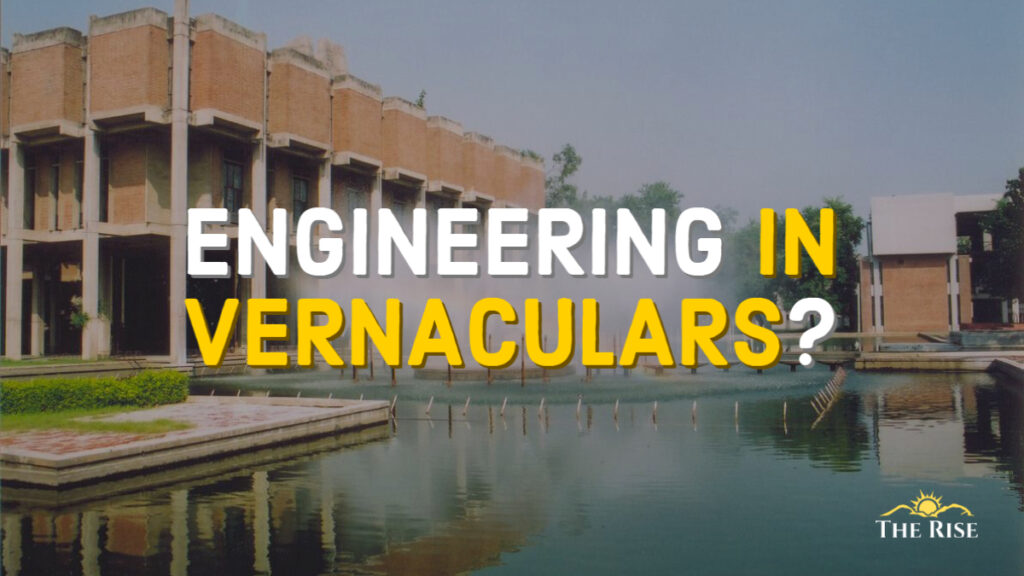Kudos to the seminal proclamation for offering engineering education in regional languages. This has rippled the whole higher technical education because of certain genuine reasons. The academic leadership seems to be worried about the implications of engineering education in regional languages along with various functional constraints.
Dating back to the replacement of India’s traditional education system by the British model of the education system by Macaulay, the evidence of incapacitating the traditional education system of the country are noticeable.
Undoubtedly, the British disrupted the country’s education system by the introduction of the English language and lowered the esteem of regional language and the nation. But at the same time, English also became a link language for communication with the outside world since independence in 1947. Now, with the country marching ahead with the same model of education for a quite long time and having entered into a regime of liberalization, the question arises whether it is prudent to suddenly roll back the medium of instruction from English to the regional language.
It is worth noting that the undergraduate engineering education has English as the medium of instruction which eventually becomes the working language for such technical professionals. However, the medium of instruction and examination is varying in Diploma and Certificate level courses of technical education in a different state in the country. The medium of instruction is other than English too at Diploma and Certificate level courses, but it does not have deeper ramifications due to the limited role assignment to such professionals, which can not be afforded in case of higher engineering education of degree and above levels. The engineering graduates and postgraduates have to lead the technological teams, ensure newer developments, innovations, interact with peers and experts abroad, head the organizations along with other roles. Accordingly, any deficiency in English language skills may affect all of their capabilities adversely.
Also Read: New Education Policy 2020 – Implementation Challenges in Higher Education
The Government at centre and states have been advocating for promoting the use of regional languages in official and other related transactions along with numerous incentives for the creation of content in such languages. Patently some success has been achieved in such initiatives. But the general perception of society concerning the potential of the English language for fetching better career prospects, mobility, effective communication, and its global acceptance as a medium of interaction can not be ignored. With the passage of time, the whole education system has largely revolved around the English language and its relevance can be felt in every stream of study. Engineering education is one of the sought-after streams and such changes in the medium of teaching may lead to a backlash.
Knowledge creation and dissemination is not a regional subject rather the knowledge created anywhere in the world should be accessible to everyone.
Unequivocally, the use of regional language in teaching engineering education shall yield a better understanding of the communications made by teachers, nevertheless, the availability of excellent engineering & related books and other study materials in higher engineering education shall be the biggest constraint. The knowledge creation and dissemination is not a regional subject rather the knowledge created anywhere in the world should be accessible to everyone so that the advancement of work done by others could be undertaken by all. Therefore, universalization of education through a common instructional language like English is inevitable for imparting higher engineering education, knowledge creation, global sharing of country’s technically trained human resource, trade & commerce, and seeking technological advancements & expertise from outside to the country.
Also Read: A View on Higher Education in New Education Policy 2020
Further, delving into the much-talked issue of poor employability of engineering graduates, the veering from teaching in English to teach in some regional language, the desired communication skills can not be achieved. In the current time, all potential employers whether from industry or any organization, envision transgressing the boundaries of the country for expanding their domain of operation. Any barrier imposed due to inadequacy of English communication skill in their employees is bound to hamper the growth of the industry & organizations in particular and the country in general.
Also Read: Work-life balance of teachers in digital learning environment
India is a proud nation with 22 languages as per the eighth schedule of the constitution of India along with more than 19500 mother tongues spoken in different parts of the country. The initiatives to offer the engineering education in regional languages will even impose enormous restrictions on harnessing the competence and capabilities of such engineering graduates in the states having different regional languages within the country itself. This situation is likely to become vulnerable in the current employment spectrum with the largest share of the total available technical jobs being from the services sector.
The country is witnessing a constant decline in the aspirants for higher technical education for the last few years due to various reasons.
Moreover, the country is witnessing a constant decline in the aspirants for higher technical education for the last few years due to various reasons. Hence the move of imparting engineering education in regional language may make aspirants of technical education much more indifferent.
In addition to the above unintentional and very serious repercussions, the assessment of preparedness of the engineering education providers for offering engineering education in regional languages shows how exasperating it would be for the institutions as they do not have the preparedness for adhering to the prescribed timeline for its enforcement. On top of everything, the availability of teachers for carrying out teaching-learning processes in regional languages, availability of study material in the respective languages, the identification of appropriate regional language(s) for teaching the whole class having students with widely varying regional language backgrounds, all other transactional limitations of interactions in a language other than English, etc. are going to be the issues of grave concern.
The move for imparting engineering education in the regional language needs to be pondered holistically with the sole aim of enhancing the competence and capabilities of engineering graduates and postgraduates.
Consequently, the move for imparting engineering education in the regional language needs to be pondered holistically with the sole aim of enhancing the competence and capabilities of engineering graduates and postgraduates. The changes should be for offering engineering students better career opportunities, that strengthen the economy and bring prosperity to the country. In view of the fast-shrinking boundaries across the nations and country’s demographic dividend, India should venture sagaciously to roll out the engineering graduates with appropriate communication skills and competence to meet the global technological requirements.
Disclaimer: The views expressed in this article are of the author solely. TheRise.co.in neither endorses nor is responsible for them.
About the author
Prof. Onkar Singh is the Vice Chancellor of Veer Madho Singh Bhandari Uttarakhand Technical University, Dehradun, He has been the Founder Vice-Chancellor of the Madan Mohan Malaviya University of Technology, Gorakhpur (U.P.). He is a Professor of Mechanical Engineering at Harcourt Butler Technical University, Kanpur (U.P.).











Unable to appreciate why it is being done?
IIT Delhi Director has also discussed it.
Read: https://www.livemint.com/education/news/offering-entire-b-tech-programmes-in-local-language-will-be-the-beginning-of-end-of-iits-11607016039161.html
https://www.outlookindia.com/website/story/india-news-regressive-retrograde-faculty-members-on-iit-nit-courses-in-vernacular/365721
Pingback: 2020: A Year of Shambolic Education Burdening Learners - TheRise.co.in
Pingback: Concerning enablers of higher education - TheRise.co.in
Pingback: Engineering without Science and Mathematics will be a disaster